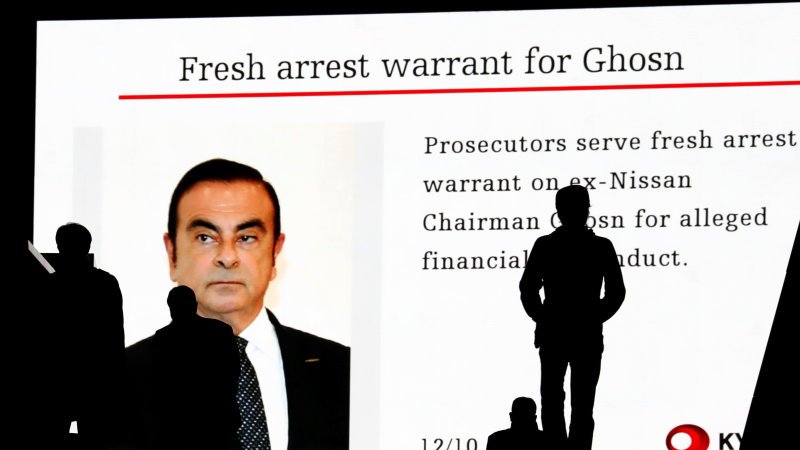Carlos Ghosn vows to 'restore my honor' in first remarks since arrest

Nissan Motor's jailed ex-chairman, Carlos Ghosn, vowed to restore his good name in court after a month in detention, Japanese public broadcaster NHK said on Friday.
"Things as they stand are absolutely unacceptable," Ghosn was quoted as saying via his lawyer. "I want to have my position heard and restore my honor in court."
It was Ghosn's first comment since his arrest on Nov 19 for allegedly understating his income by about half over a five-year period from 2010. He was later charged with the same alleged crime covering the past three years.
A call to the office of his lawyer, Motonari Otsuru, went unanswered outside business hours early on Friday. The lawyer has previously declined to return calls for comment on the Ghosn case.
A Tokyo court on Thursday unexpectedly rejected prosecutors' request to extend Ghosn's detention, which Japanese media said means he could go free on bail as early as Friday.
Ghosn wants to hold a news conference after he is released, NHK quoted his lawyer as saying. The executive, who formed a carmaking alliance among Nissan, Mitsubishi Motors Corp and France's Renault SA, said he is not a flight risk and wants to be able to travel abroad, the report said.
The Ghosn case has put Japan's criminal justice system under international scrutiny and sparked criticism for some of its practices, including keeping suspects in detention for long periods and prohibiting defense lawyers from being present during interrogations, which can last eight hours a day.
Japan has also come under fire for its 99.9 percent conviction rate.
The Tokyo court unexpectedly ruled not to extend Ghosn's detention. It said it had also decided against extending detention for Greg Kelly, a former Nissan executive who was arrested along with Ghosn on Nov. 19.
It later overruled an appeal by prosecutors against the decision, clearing the way for the possible release of the two men as early as Friday.
The court did not disclose reasons for its decision, and NHK said it was "extremely rare" for it to reject the prosecutors' request to extend detention.
If Ghosn and Kelly are granted bail, conditions may require them to apply for permission to travel overseas. They could also be barred from contacting Nissan officials.
Both executives had not been able to make any public statements since their arrest, although local media have reported that they have denied wrongdoing.
Ghosn was indicted on Dec. 10 for allegedly understating his income by about half over a five-year period from 2010, and was re-arrested for the same alleged crime covering the past three years. The 10-day detention period for the second allegation ran out on Thursday, and the court was widely expected to extend it for at least another 10 days. Granting bail to suspects who say they are innocent has until recently been unusual in Japan.
It was not clear how much bail would be, or if it would be granted. Activist fund manager Yoshiaki Murakami, arrested in 2006 for insider trading, paid an initial 500 million yen ($4.5 million) in bail.
The court's decision could reflect sensitivity to criticisms of the Japanese justice system as well as changing attitudes, said Masashi Akita, a defense lawyer in Osaka with over 30 years' experience.
"They are very nervous about criticism of their lenient approach toward detention. This is a typical case of such changing, I suppose," Akita said in emailed responses to Reuters' questions. "I think this case has a big impact and effect on the Japanese justice practice, and such a move is favorable for the defense side."
Ghosn has been detained in a small room without a heater and with a toilet in the corner. Authorities have limited his opportunities to shower and shave, a person familiar with the matter previously told Reuters.
The scandal has shaken the Nissan-Mitsubishi-Renault alliance, with Nissan CEO Hiroto Saikawa calling for changes to weaken the clout of Renault SA, which owns a controlling stake in Nissan. There have been conspiracy theories surrounding Ghosn's arrest.
Renault has so far not replaced Ghosn as its head, saying his compensation had been in compliance with its own guidelines.
Documents seen by Reuters showed that some discussions about compensating Ghosn out of the public eye were not confined to Nissan, but also included Renault executives. Renault told Reuters that any such pay would have had to be made public in France.
Nissan on Thursday said Saikawa earlier this week held a one-on-one meeting with Renault acting boss Thierry Bollore, saying Saikawa described the meeting as "positive." It did not disclose details of the discussions.
Related News
